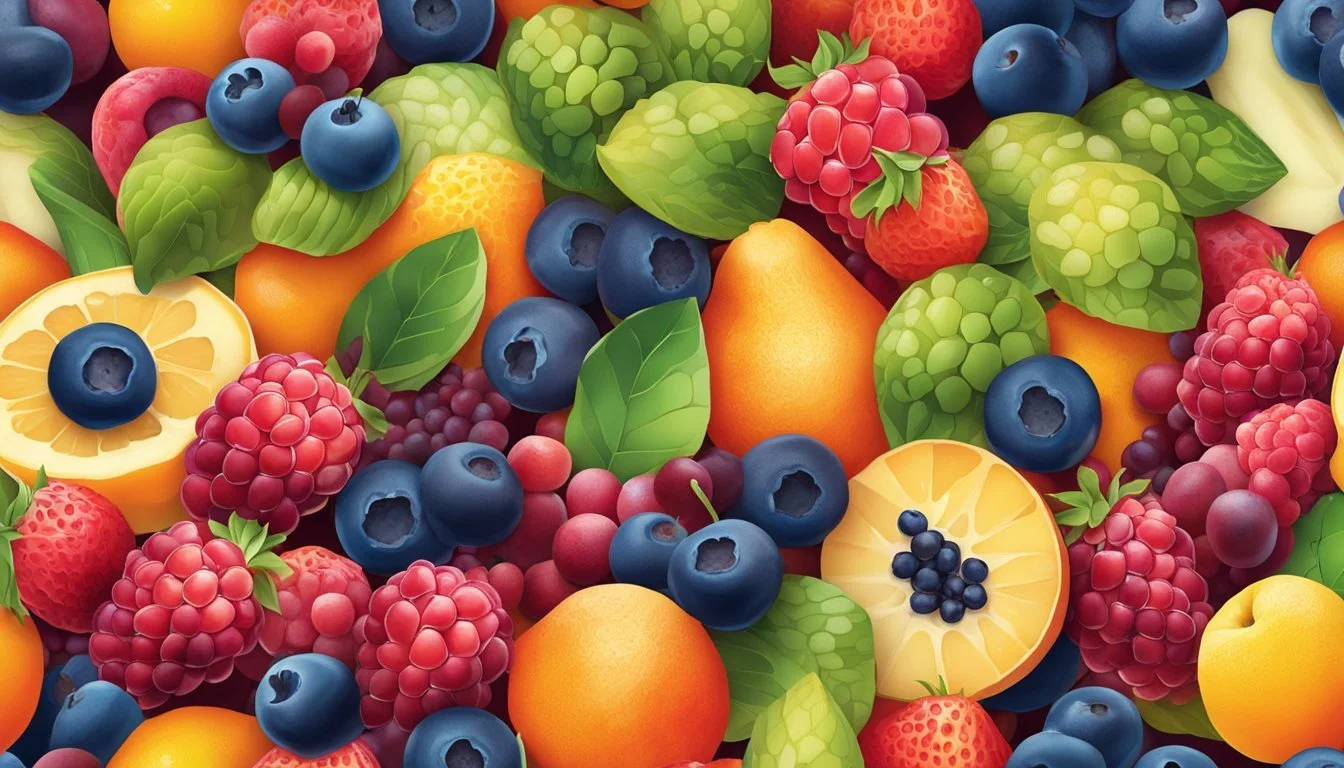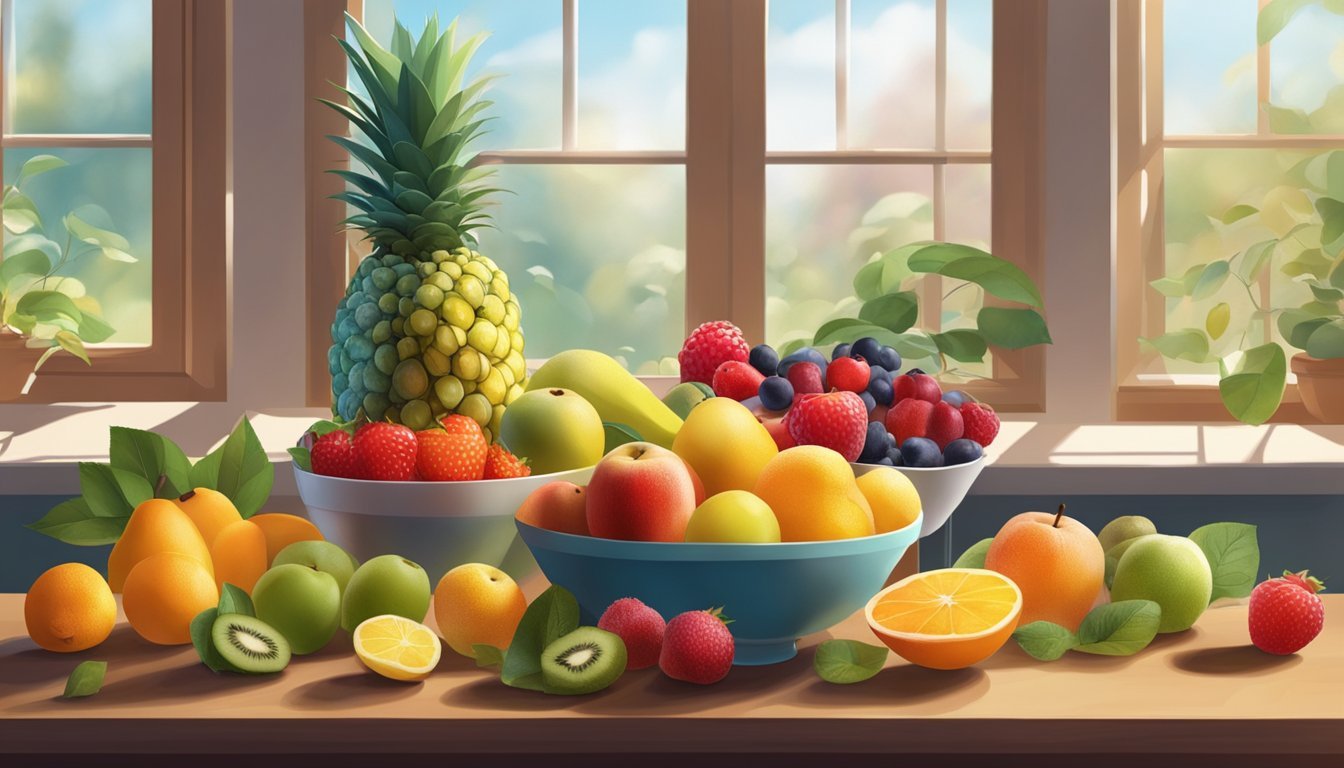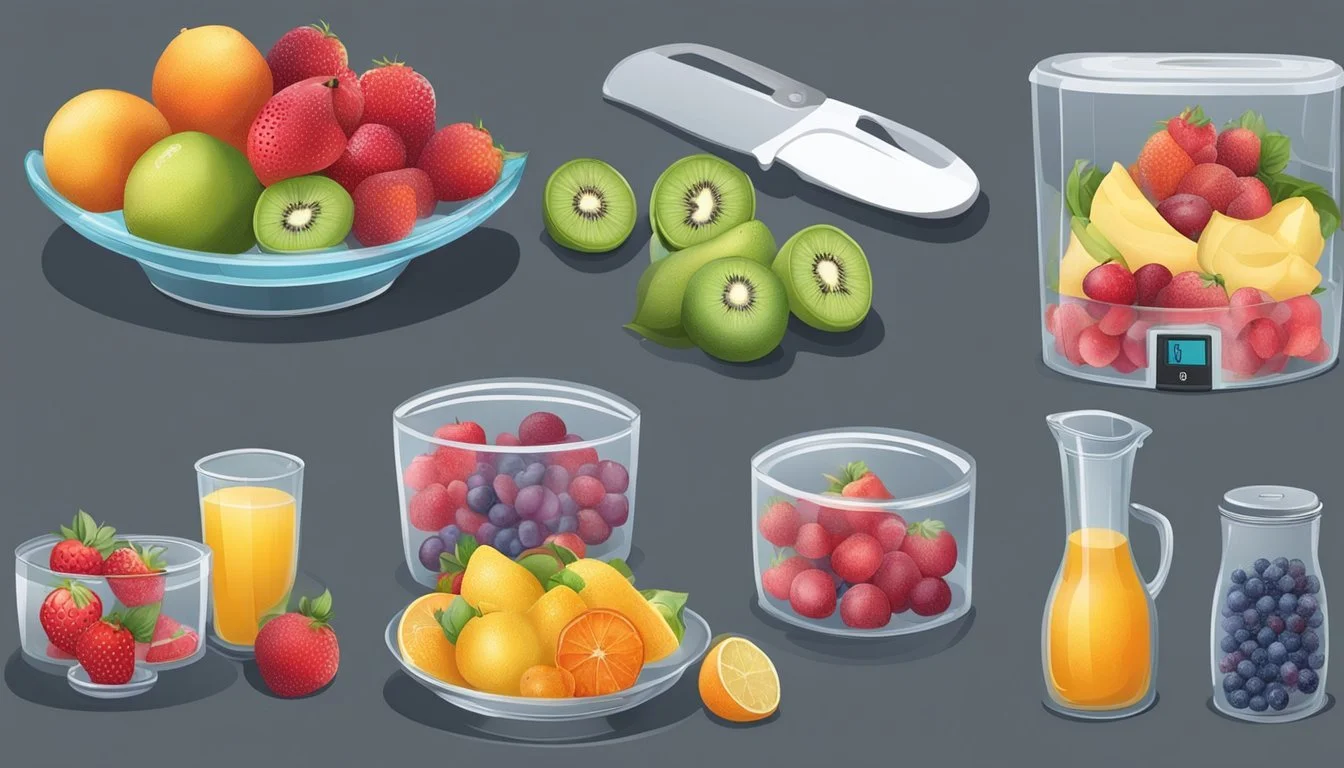Frozen vs Fresh Fruit: Reddit's Take on the Produce Debate
The debate between frozen and fresh fruit has sparked discussions on Reddit's nutrition forums. Many users seek to understand which option provides better nutritional value and convenience.
Frozen fruits are generally as healthy as fresh fruits, often retaining more nutrients due to being picked and frozen at peak ripeness. This preservation method locks in vitamins and minerals, making frozen options a smart choice for those seeking year-round access to nutritious produce.
Cost and longevity are additional factors to consider. Frozen fruits tend to be more budget-friendly and have a longer shelf life compared to their fresh counterparts. This advantage allows consumers to stock up on their favorite fruits without worrying about spoilage, reducing food waste and saving money in the process.
Comparing Nutritional Values
Frozen and fresh fruits differ in their nutritional content due to various factors. The preservation process and storage duration can impact the levels of vitamins, minerals, and antioxidants present in fruits.
Vitamin and Mineral Content
Frozen fruits often retain higher levels of certain nutrients compared to their fresh counterparts. Vitamin C content in frozen fruits can be significantly higher, with some studies showing increases of over 3000% in certain fruits like apricots.
Antioxidants, including vitamin E and carotenoids, are also well-preserved in frozen fruits. For example, frozen apricots have shown increases in beta-carotene (35%) and overall antioxidant content (529%) compared to fresh varieties.
Minerals like iron are generally stable during the freezing process. The fiber content of frozen fruits remains largely unchanged, providing similar digestive benefits to fresh options.
Impact of Preservation on Nutrients
Flash freezing helps lock in nutrients at their peak, often preserving more vitamins and minerals than fresh fruits that have been transported and stored. This preservation method is particularly effective for delicate nutrients like vitamin C.
However, some nutrient loss can occur during long-term frozen storage. Despite this, frozen fruits typically maintain higher nutrient levels than fresh fruits that have been sitting on shelves for extended periods.
Phenolic compounds, which contribute to the antioxidant properties of fruits, are well-preserved in frozen options. Some frozen fruits have shown increases of over 400% in polyphenol content compared to their fresh counterparts.
Health and Wellness Considerations
Frozen and fresh fruits offer distinct nutritional profiles and health impacts. Both options provide essential vitamins, minerals, and antioxidants that support overall wellbeing.
Benefits of Frozen and Fresh Produce
Frozen fruits retain high nutrient levels due to quick processing after harvest. This preservation method locks in vitamins and antioxidants, often resulting in higher concentrations compared to fresh counterparts.
Fresh fruits picked at peak ripeness deliver optimal nutritional value. They contain natural enzymes and phytonutrients that support digestive health and immune function.
Both frozen and fresh fruits contribute to heart health by providing fiber and potassium. These nutrients help lower blood pressure and reduce the risk of cardiovascular disease.
Frozen fruits offer convenience and year-round availability, making it easier to meet daily fruit intake recommendations. This accessibility can positively impact long-term health outcomes.
Potential Risks and Considerations
Fresh fruits may lose nutritional value during transport and storage. Extended shelf time can lead to decreased vitamin content, particularly vitamin C.
Frozen fruits sometimes contain added sugars or preservatives. It's important to check labels and choose options without unnecessary additives to avoid excess calorie intake.
Some frozen fruits may undergo texture changes upon thawing, which can affect palatability and enjoyment. This might impact overall consumption and nutritional benefits.
Fresh fruits carry a higher risk of spoilage and foodborne illness if not properly handled or stored. Proper washing and storage practices are crucial to minimize these risks.
Both frozen and fresh fruits can be part of a balanced diet for managing diabetes. Portion control remains key, as fruit contains natural sugars that affect blood glucose levels.
Culinary Uses and Flavor
Frozen and fresh fruits offer distinct advantages in culinary applications. Their flavor profiles and texture characteristics impact how they perform in various recipes and dishes.
Culinary Versatility
Frozen fruits excel in smoothies, creating thick, frosty textures. They blend easily without diluting flavors. In baked goods, frozen berries maintain shape better than fresh, preventing bleeding into batters.
Fresh fruits shine in salads and as garnishes. Their crisp textures and vibrant colors enhance presentation. For sauces and jams, fresh fruits provide brighter flavors but may require more cooking to achieve desired consistency.
Both frozen and fresh fruits work well in sauces and soups. Frozen fruits can be a convenient option for off-season cooking, while fresh fruits offer peak-season flavors.
Flavor and Texture Profile
Fresh fruits typically have more pronounced, complex flavors. Their crisp textures and juicy qualities make them ideal for eating raw or in lightly prepared dishes.
Frozen fruits may have slightly muted flavors due to the freezing process. However, they're often picked at peak ripeness, preserving much of their taste. When thawed, frozen fruits can become softer and release more moisture.
In cooked applications, the flavor difference between fresh and frozen fruits often becomes less noticeable. Frozen fruits can actually retain more nutrients in some cases, as they're frozen shortly after harvesting.
For optimal flavor in raw preparations, fresh fruits are generally preferred. In cooked dishes or blended beverages, frozen fruits can be a practical and flavorful alternative.
Convenience and Storage
Frozen and fresh fruits offer distinct advantages in terms of convenience and storage. The choice between them often depends on individual preferences, lifestyle, and kitchen setup.
Ease of Preparation
Frozen fruits require minimal preparation. They come pre-washed, peeled, and cut, saving valuable time in the kitchen. Simply scoop out the desired amount for immediate use. Fresh fruits need washing, peeling, and cutting before consumption.
Frozen fruits blend easily into smoothies without the need for ice. They're ideal for baking, as they maintain shape and prevent excess moisture in batters. Fresh fruits may require additional steps like thawing or mashing for certain recipes.
Longevity and Storage Methods
Frozen fruits have a significantly longer shelf life compared to fresh fruits. They can be stored in the freezer for 6-12 months without losing quality. This reduces food waste and allows for bulk purchasing.
Fresh fruits have a shorter lifespan, typically lasting 3-7 days when refrigerated. Some fruits, like bananas and avocados, don't require refrigeration but spoil quickly. Proper storage techniques can extend freshness:
Store berries unwashed in breathable containers
Keep apples in the crisper drawer
Refrigerate cut fruits in airtight containers
Frozen fruits take up more freezer space but remain accessible year-round. Fresh fruits offer immediate enjoyment but require frequent shopping trips to maintain a steady supply.
Cost and Seasonality
Fresh and frozen fruits each have distinct advantages when it comes to cost and availability throughout the year. The best choice often depends on current market prices and the time of year.
Budget-Friendly Options
Fresh fruits can be incredibly affordable when purchased in season. Local farmers' markets and grocery stores often offer deals on produce at peak harvest times. A quart of strawberries or a pint of blueberries may cost as little as $1 during summer sales.
Frozen fruits provide consistent pricing year-round. They're often economical when fresh counterparts are out of season or expensive. Mangoes, for instance, can be a better buy frozen if fresh ones aren't available for around $1 each.
It's crucial to compare prices per pound. Fresh fruit weight includes inedible parts like pits and peels, which can account for 30-40% in mangoes.
Seasonal Availability
Fresh fruit quality and pricing fluctuate with the seasons. Summer brings an abundance of berries, peaches, and melons at lower prices. Winter sees citrus fruits peak in flavor and affordability.
Frozen fruits offer year-round access to out-of-season produce. This consistency allows for enjoying summer fruits like strawberries in winter months without paying premium prices for fresh imports.
Some consumers buy fresh fruit in bulk when it's in season and freeze it themselves. This method combines the cost savings of seasonal purchases with the convenience of frozen fruit.
Environmental and Safety Considerations
Organic farming practices and preservation methods significantly impact the environmental footprint and safety of fruits. These factors play a crucial role in consumer choices between fresh and frozen options.
Organic and Farm Sourcing
Organic farming reduces pesticide use, benefiting ecosystems and consumer health. Some Reddit users report washing conventional produce thoroughly to remove pesticide residues. Consumer Reports found 33 different pesticides on 76% of U.S-grown spinach samples, highlighting the importance of organic options.
Frozen fruits often come from farms optimized for immediate processing, potentially reducing food waste. This efficiency can lower the overall environmental impact compared to fresh fruits that may spoil during transport or storage.
Local sourcing for fresh fruits can decrease transportation emissions. However, frozen fruits allow for year-round consumption without relying on long-distance shipping of out-of-season produce.
Safety in Preservation Process
Freezing fruits quickly after harvest locks in nutrients, sometimes surpassing the nutritional value of fresh counterparts that degrade during transport and storage. A study funded by the Frozen Food Foundation found that frozen fruits often had higher levels of vitamin E than fresh alternatives.
The freezing process also acts as a natural preservative, eliminating the need for additional chemical treatments. This can be particularly beneficial for consumers seeking to minimize exposure to artificial additives.
Food safety protocols in commercial freezing facilities help reduce the risk of foodborne illnesses. Proper freezing and storage temperatures inhibit bacterial growth, potentially making frozen fruits a safer option in some cases.
Processed Fruits and Their Alternatives
Processed fruits come in various forms, with canned and frozen options being popular alternatives to fresh produce. These options offer convenience and extended shelf life, but their nutritional content can differ from fresh fruits.
Canned Fruits and Vegetables
Canned fruits and vegetables provide a convenient and long-lasting option for consumers. Many canned fruits are packed in syrup or juice, which can add extra sugar and calories. Some canned fruits are available in water or their own juices, offering a healthier choice.
Canned vegetables often contain added sodium for preservation. To reduce sodium intake, rinsing canned vegetables before use can help. Some manufacturers offer low-sodium or no-salt-added options.
Canned produce can be a good source of fiber and certain nutrients. For example, canned tomatoes may have higher levels of lycopene compared to fresh ones.
Frozen vs. Canned: Nutritional Differences
Frozen fruits and vegetables are often picked at peak ripeness and quickly frozen, preserving many of their nutrients. They typically don't contain added sugars or sodium, making them a healthier choice compared to some canned options.
Canned fruits may have added sugar in the form of syrups. Choosing fruits packed in water or their own juices can help reduce sugar intake. Frozen fruits can be used in smoothies or as toppings for yogurt without the need for added sauces or sweeteners.
Vitamins and minerals in frozen produce are generally well-preserved. Canned vegetables may lose some water-soluble vitamins during the canning process, but they can still be nutritious. Both frozen and canned options can be part of a healthy diet when chosen wisely.
Specific Types of Produce
Different fruits and vegetables have varying characteristics when frozen or fresh. Some retain nutrients and flavor better in frozen form, while others are best enjoyed fresh.
Leafy Greens and Vegetables
Spinach freezes exceptionally well, maintaining its nutritional value and texture. Many people find frozen spinach more convenient for cooking and adding to dishes. Frozen broccoli retains its nutrients and is often more affordable than fresh, especially out of season.
Green beans are another vegetable that freezes nicely. They maintain their crunch and flavor when properly frozen. Fresh green beans can be more expensive and have a shorter shelf life.
For leafy greens and vegetables, frozen options often provide good value and convenience without significant quality loss.
Berries and Stone Fruits
Strawberries and blueberries freeze remarkably well. Frozen berries are picked at peak ripeness and quickly frozen, preserving their nutritional content. They're perfect for smoothies, baking, and cooking.
Fresh berries offer superior texture and flavor for eating raw. However, they spoil quickly and can be expensive when out of season.
Peaches lose some texture when frozen but retain their flavor and nutrients. Fresh peaches are best for eating out of hand, while frozen peaches work well in cobblers, pies, and smoothies.
For berries and stone fruits, the choice between fresh and frozen often depends on intended use and seasonal availability.







